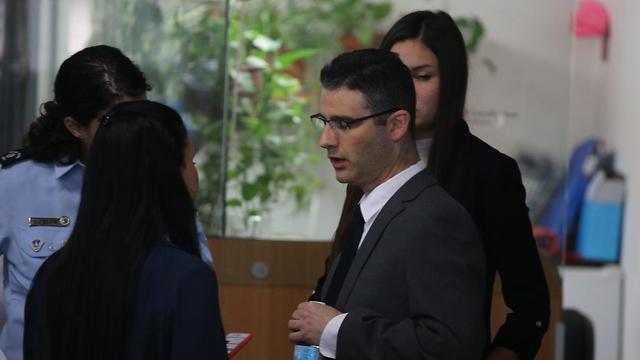

Ombudsman recommends judge face disciplinary hearing
Former justice Rivlin recommends Judge Poznanski-Katz, who held problematic correspondence with Case 4000 prosecutor, face a disciplinary hearing, stresses no criminality in her actions; over proximity between the two, however, led to 'contempt,' Rivlin adds but strikes down notions of 'miscarriage of justice or conspiracy' against suspects; Justice Minister Shaked says further decision forthcoming after studying report.
Ombudsman for Complaints against Judges and former justice Eliezer Rivlin presented Supreme Court Chief Justice Esther Hayut and Justice Minister Ayelet Shaked Tuesday afternoon with conclusions from his inquiry into the conduct of Judge Ronit Poznanski-Katz, who corresponded with a Securities Authority attorney on the remand hearings for Case 4000 suspects. Rivlin recommended the judge face a disciplinary hearing but was of the opinion her acts were not criminal.
Former justice Rivlin noted in his report that, "Direct contact between an investigator representing the Securities Authority and a judge overseeing the Authority's cases lasted many days.
"The direct relationship, which began with mere logistical coordination, soon became improper dialogue."

The ombudsman further said that, "During the months of June, July and December in 2017 and January and February in 2018, attorney Shacham-Shavit contacted the judge several times on the matter of the hearing she was set to preside over, in which he himself was set to participate.
"The beginning of said close proximity was indeed with texts seeking to coordinate logistics directly, but continued with the exchange of more personal messages on the part of the judge, such as, 'Please ask (the police's representative) to arrive at ten thirty because the court has not yet returned from riding bicycles.'
"This message was then answered with, 'Okay, the court should watch that it doesn't fall.'"

Rivlin later clarified in his report that the texts constituted "improper proximity between a litigant and a judge.
"The proximity between the judge and the prosecution's representative produced contempt. The messages exchanged should not have been written, and would not have been written had the judge not allowed this proximity with the Securities Authority's representative to be engendered and had she not allowed him to directly contact her. Direct ties between the two should not have been established. "
However, Ombudsman Rivlin unequivocally stated that his inquiry showed that such "secrets" would have been made known to the judge by the prosecution officially sooner or later in any case.
"There was absolutely no miscarriage of justice or a conspiracy between the prosecution and the court here," he concluded.
'Egotistical tug of war between police and Securities Authority'
Another issue broached by the report was the tensions and the "egotistical tug of war" between investigators from the police's Lahav 433 anti-corruption unit and Securities Authority personnel tasked with investigating the case.

Former justice Rivlin quoted Commander Or Rubin of Lahav 433 in his report, who said that, "Professional tensions existed. It existed both in (the Securities Authority) and Lahav and between us and investigators… This tension is only natural, because the world they come from and our own world are different."
Attorney Ophir Strashnov, who represents Judge Poznanski-Katz, responded to the ombudsman's decision by saying, "It was unequivocally proven that the judge did not harm the rights of the suspects or their attorneys, and that the correspondence had a simple explanation whose details were provided to the ombudsman.
"It was merely a technical correspondence between a judge and a Securities Authority representative which had to do with the latter's relationship with the police's representative and a prosecution-only discussion meant to take place in her chambers—rather than the arrest hearing set to take place in court with both parties present.
"In this matter, as in all other matters she presided over, Judge Poznanski-Katz examined each request diligently and her decisions were driven by purely legal considerations, without bias or prejudice, and while paying the utmost respect to human dignity and liberty."
Shaked provides Rivlin with vote of confidence
Earlier Tuesday, Minister Shaked said Rivlin's report would carry much weight in her eyes. "I trust Justice Rivlin fully," she said. "He is meticulous and it is with good reason that we asked him to look into the matter."
"He also availed himself of Eran Shacham's interrogation at the Civil Service Commission, and questioned not only the judge by also Lahav 433's representatives," Shaked said at the National Conference on Energy organized by the Israeli Institute for Energy and the Environment in Tel Aviv.
"I think his opinion is of the utmost importance. I want to to study the facts first, as well as the report, get acquainted with the details and only then will I decide what to do," she explained.
"After the incident I spoke with several judges, both past and present, as well as with attorneys. Remand extensions are handled by the police rather than the State Attorney's Office. All of the judges said they correspond in order to coordinate. They have no paralegals or interns, and so they have to do all of the work themselves," the minister elucidated.
Judiciary officials: Serious gap between Rivlin's report and decision
Justice Minister Shaked and Chief Justice Hayut will discuss in the coming days the two possible routes open to them: acting in accordance with Rivlin's report and creating a tribunal of former justices for a disciplinary hearing against Poznanski-Katz or attempt to dismiss her through a hearing of the Judicial Selection Committee.
Senior judiciary officials told Ynet a serious gap existed between Rivlin's scathing report—which alleged that the proximity between the two produced "contempt" and showed that Poznanski-Katz's misconduct harmed the public's trust in the judiciary—and the decision to only have her face a disciplinary hearing.
The officials were, then, of the opinion her dismissal should be considered.
Other judiciary officials voiced their expectation Monday evening for Judge Ronit Poznanski-Katz to resign of her own volition, before conclusions from the Ombudsman for Complaints against Judges' inquiry are published.
The judiciary officials nevertheless maintained Poznanski-Katz cannot remain within the judicial system as she has lost her moral high-ground in the wake of the publication of texts between the arrests judge and Israel Securities Authority attorney Eran Shacham-Shavit before hearing on the remand extensions of suspects embroiled in the Bezeq corruption affair.
Should Judge Poznanski-Katz continue to refuse to step down, a dismissal process may be put in motion. The process allows for a judge to be ousted on the recommendation of the justice minister or Supreme Court chief justice and a vote by the Judicial Selection Committee, which must then vote in favor of dismissal with a seven-member majority.
According to a Guy Peleg report on Channel 2 News, however, the judge entertained no notions of resigning. The report quoted a high-ranking judiciary source close to Poznanski-Katz who said that, "The Courts Administration was a very demanding system that failed to provide judges with even the barest of conditions.
"The judge had no secretary and no paralegal. When she put in a request for a typist she was shouted at. She had to do all of the coordinating (for the hearings) from her private phone. She's been swarmed since yesterday, called in to the ombudsman on a moment's notice.
"She wasn't given time to prepare and the ombudsman was himself demanded to reach a decision at the drop of a dime."
Poznanski-Katz's friend then summarized by saying, "The justice minister had already announced she put in motion a dismissal process and that a date was being set for the Judicial Selection Committee to convene on dismissal. They're on an all-out attack directed at an exemplary, esteemed employee."
Justice Minister Shaked said Monday she would impeach any judge who commits a criminal offense, noting "If we learn of a judge who transgressed, he won't remain a judge."
The justice minister added, "If the need arises, I will convene the Judicial Selection Committee and we will enact the impeachment authority.
"I was outraged along with all Israeli citizens. The correspondence that was revealed constitutes a serious blow to the public's trust in the judicial system.
"If the examination raises suspicions of criminal activity, the ombudsman will pass on the case to the attorney general."
















